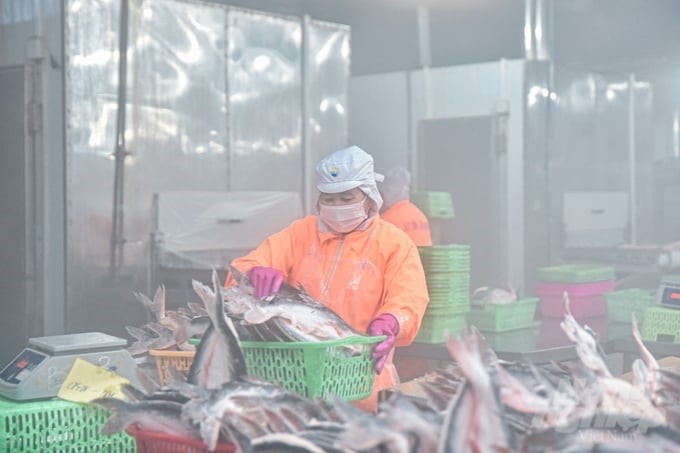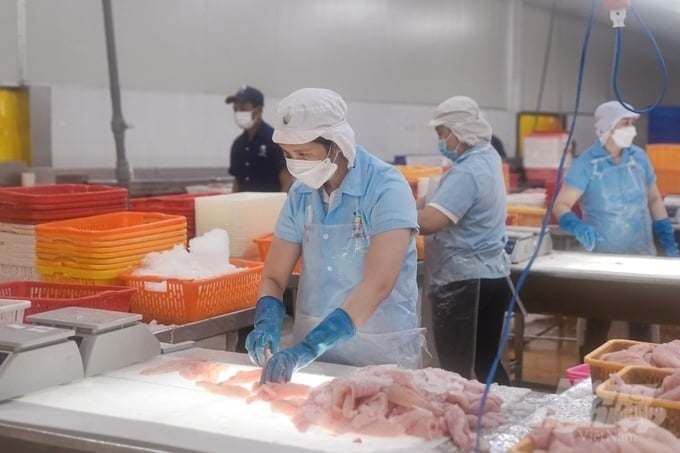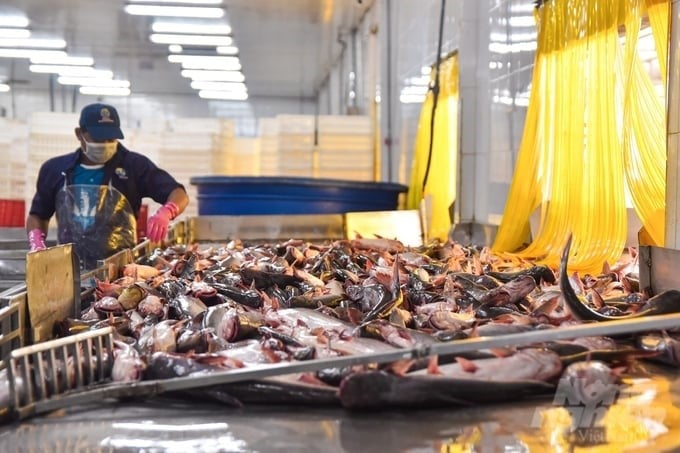June 2, 2025 | 09:39 GMT +7
June 2, 2025 | 09:39 GMT +7
Hotline: 0913.378.918
June 2, 2025 | 09:39 GMT +7
Hotline: 0913.378.918
Currently, the entire country has over 100 pangasius processing facilities, with a total design capacity estimated at 1.5 million tons of raw materials per year. This commodity is present in 134 countries and territories around the world, with an annual export turnover of over USD 2 billion. Most of these facilities have been equipped with modern machinery, equipment, and technology to meet the requirements and standards of export markets.

The entire country currently has over 100 pangasius processing facilities, with a total design capacity estimated at 1.5 million tons of raw materials per year. Photo: Kim Anh.
However, the application of technology to reuse by-products from pangasius to reduce pressure on the environment and create raw materials for other processing industries is still limited.
By-products from pangasius processing, such as head, bones, skin, fins, viscera, fat, blood, etc., can all be utilized to produce high-value products such as fish oil, fish meal, collagen, pharmaceuticals, cosmetics, and organic fertilizers.
This identification was mentioned by Dr. Pham Thi Thu Hong, Deputy Secretary General of the Vietnam Pangasius Association, at the Talkshow "Developing a Circular Economy in the Pangasius Industry Chain”, organized by the Vietnam Agriculture Newspaper.
This expert assessed that 95% of Vietnam's exported pangasius is now in fillet form. That means only 5% of other value-added products from pangasius are exploited.
“Our pangasius industry ignored a huge amount of by-products and waste products. If localities and businesses do not have solutions for appropriate exploitation and treatment, it obviously has a negative impact on the environment and ignores a great source of value," said Dr. Thu Hong.

95% of Vietnam's exported pangasius is now in fillet form, and the exploitation of other value-added products from pangasius is still limited. Photo: Kim Anh.
In recent times, only a few businesses or large corporations have enough potential, awareness of the issue of reducing environmental emissions, and efforts to apply scientific and technological advances to boldly invest in production lines aiming to produce and create deeply processed products for other industries.
One of the by-products and waste products that has great potential but has not been taken advantage of or fully exploited is fish blood. All the while, this is a large source of raw materials to make blood meal to supply the animal feed processing industry very effectively.
According to Dr. Thu Hong, the cause of the situation is the characteristics of the production technology line. This will be an issue that scientists need to focus on solving in the coming time to increase the efficiency of resource use, reduce emissions into the environment, and contribute to the circular economy of the pangasius industry.
Dr. Thu Hong affirmed that it is time for pangasius processing businesses to improve their social responsibility in reducing greenhouse gas emissions in the industry through a series of fundamental solutions to promote the effective and sustainable development of the pangasius industry.

Utilizing pangasius by-products and waste products will create a large source of raw materials to serve other processing industries. Photo: Kim Anh.
Specifically, processing businesses should pay attention to investing and synchronizing technology lines to produce value-added products and increase the proportion of deeply processed pangasius products. Thereby contributing to raising the position of Vietnamese pangasius in the international market, proving to the market that ‘pangasius production has contributed to environmental protection, reducing greenhouse gas emissions, a global goal that is being pursued’”.
Besides, these activities will create great jobs for the local workforce. Dr. Thu Hong said that this is one of the criteria to evaluate the position of a business when both practicing international standards and ensuring social welfare. Thus, the business’s production efficiency is increasingly improving and can confidently expand the market and promote the Vietnamese seafood industry chain to become greener, cleaner, and more sustainable in the coming time.
In October 2023, pangasius exports reached USD 189 million, an increase of 5% over the same period in 2022. As accumulated in the first 10 months of 2023, pangasius exports have reached over USD 1.5 billion. The Vietnam Association of Seafood Exporters and Producers (VASEP) identified that pangasius exports are showing positive signs after positive information from the inspection program of the US Food Safety and Inspection Service (FSIS).
Translated by Huyen Vu Thu

(VAN) Several scientists and farmers are experimenting with soil treatment in some key durian-growing regions such as Cai Lay (Tien Giang), Dak Song, Gia Nghia, and Dak R’lap (Dak Nong).
/2025/05/25/4127-3-073637_820.jpg)
(VAN) Thanks to the promotion from an FAO-implemented project, vegetable production in greenhouses in Moc Chau has seen strong development, from 1.5 hectares in 2021 to nearly 50 hectares in 2024.

(VAN) FAO has recently supported USD 140,000 to implement the project 'Risk mitigation human-animal interface risks through disease control initiatives in pig farming.'

(VAN) The People's Committee of Tra Vinh province has approved an adjustment to the investment policy for the Green Hydrogen Plant project, increasing its area to approximately 52.76 hectares.
![Reducing emissions from rice fields: [2] Farmers’ commitment to the soil](https://t.ex-cdn.com/nongnghiepmoitruong.vn/608w/files/news/2025/05/05/dsc08881jpg-nongnghiep-140632.jpg)
(VAN) Clean rice cultivation model in Thuong Tan commune, Bac Tan Uyen district, is assisting local residents in achieving sustainable agriculture by substantially reducing costs, increasing productivity, and protecting the environment.

(VAN) At the conference to disseminate Resolution No. 68, AgriS introduced its digital agricultural ecosystem and reaffirmed its commitment to accompanying the Government in promoting private sector development and sustainable agriculture.

(VAN) 'Blue Ocean - Blue Foods' initiative is designed to restore marine ecosystems and establish sustainable livelihoods for local communities by cultivating a minimum of 1,000 hectares of cottonii seaweed in the first three years.